388 From a star scholar to an emperor of the Three Dynasties, who is Wang Huning who has advanced to the pinnacle of the CCP's power?
Beast Note: Today, because I was writing Chen Guanzhong, I remembered that the prototype of He Dongsheng, an important character in his novel "The Prosperous Age", is said to be Wang Huning, so I thought of writing about Wang Huning.
In 2009, Hong Kong writer Chen Guanzhong's political prophecy novel "Golden Age: China, 2013" was published in Hong Kong, predicting the arrival of a prosperous utopia. At that time, the outside world generally believed that the lifelike national leader He Dongsheng in the novel was based on Wang Huning.
In "The Prosperity", He Dongsheng's confession after being kidnapped, the analysis of the "Ice and Fire Prosperity Project", "Pan-Eurasia Energy Bridge", the use of big data to control prices, the East Asian Monroe Doctrine and the tributary system, etc., can be seen Wang Huning's thinking The shadow of the context, and read the ideas and analysis that are consistent with the Chinese Dream and the Belt and Road Initiative. The "post-totalitarian autocratic big government" in the novel also seems to have the same allusion to the centralized modernization model carefully laid out by Wang Huning.
Let’s start with Wang Huning from Wikipedia.
Wang Huning (October 6, 1955 -) is a politician and one of the current main leaders of the Communist Party of China and the People's Republic of China. A native of Laizhou, Shandong[2], born in Shanghai. Born in academia, he used to be a master of law, professor and doctoral supervisor in international politics at Fudan University. He joined the work in February 1977 and joined the Communist Party of China in April 1984. Wang Huning is a member of the Standing Committee of the Political Bureau of the 19th Central Committee of the Communist Party of China (ranked fifth) and the number one secretary of the Central Secretariat, and a major contributor to Xi Jinping and former general secretaries of the CPC Central Committee Hu Jintao and Jiang Zemin[3].
Wang Huning is a member of the 16th to 19th Central Committee of the Communist Party of China, member of the 18th to 19th Central Political Bureau, secretary of the 17th and 19th Central Committee Secretariat, director of the Policy Research Office of the Central Committee of the Communist Party of China, director of the Central Civilization Committee, and Director of the Office of the Comprehensively Deepening Reform Committee.
Early experiences
Wang Huning was born in Shanghai on October 6, 1955. He was originally from Ye County, Shandong Province (now Laizhou City, Shandong Province). After graduating from Shanghai No. 54 Middle School in 1972, he was recommended to Shanghai Normal University (now East China Normal University) [Note 1] Study French in the Department of Foreign Languages. In 1977, he served as a cadre of the Shanghai Publishing Bureau and engaged in research work at the Shanghai Academy of Social Sciences. He took the college entrance examination in 1978, and was directly admitted as a master's student in the Department of International Politics of Fudan University due to his excellent results. In 1981, he obtained a master's degree in law[4].
After graduation, Wang Huning stayed at the school to teach. He successively served as a teacher, associate professor, and professor of the Department of International Politics at Fudan University . In 1988, he worked as a visiting scholar at the University of Iowa and the University of California, Berkeley for one year. In 1989, he became the dean of the Department of International Politics, and in 1994, he became the dean of Fudan University Law School. In April 1984, he joined the Communist Party of China and became the object of training of Wang Bangzuo, then director of the political science teaching and research section of Fudan University [5].
Wang Huning was already a well-known young scholar in the academic circle in the 1980s. He became the cover figure of current affairs magazines such as "Ban Yue Tan" at that time. The drafting work of important theoretical documents of the Communist Party of China. In 1993, Wang Huning became famous as an advisor to the debate team of Fudan University and won the championship in the "International Collegiate Debate Conference"[6][7].
enter the center

In April 1995 , under the strong recommendation of Wu Bangguo, then Vice Premier of the State Council , and Zeng Qinghong, then Director of the General Office of the Central Committee of the Communist Party of China, Jiang Zemin, then General Secretary of the Central Committee of the Communist Party of China, was promoted to Beijing as a "special assistant"[8] to serve as a policy advisor to the Central Committee of the Communist Party of China. Leader of the political group of the research lab. In April 1998, he served as the deputy director of the Central Policy Research Office. Finally, in November 2002, he was promoted to the director of the Central Policy Research Office and was elected as a member of the 16th Central Committee of the Communist Party of China.
As the main planner, Wang Huning directly participated in and drafted Jiang Zemin's "Three Represents" important thought, Hu Jintao's "Scientific Outlook on Development" and Xi Jinping's "Thoughts on Socialism with Chinese Characteristics for a New Era" and other major political theories and thoughts, and assisted the three generations of general secretaries. It is an important theoretical think tank of the top leaders of the CCP [9].
On October 22, 2007, at the First Plenary Session of the Seventeenth Central Committee of the Communist Party of China, 52-year-old Wang Huning was elected as the secretary of the Central Committee of the Communist Party of China and became the leader of the party and the country. After Deng Liqun, he is another theoretical person who holds the position of secretary of the Secretariat of the Central Committee.
On November 15, 2012, at the First Plenary Session of the Eighteenth Central Committee of the Communist Party of China, he was elected as a member of the Political Bureau of the Central Committee of the Communist Party of China. During the 18th Central Committee, Wang Huning, as director of the Central Policy Research Office, and Li Zhanshu, director of the Central Office, accompanied Xi Jinping to attend all internal and external events[10]. In January 2014, after the establishment of the Central Leading Group for Comprehensively Deepening Reform, Wang Huning served concurrently as the director of the Central Reform Office, and his political weight increased day by day [11].
Politburo Standing Committee
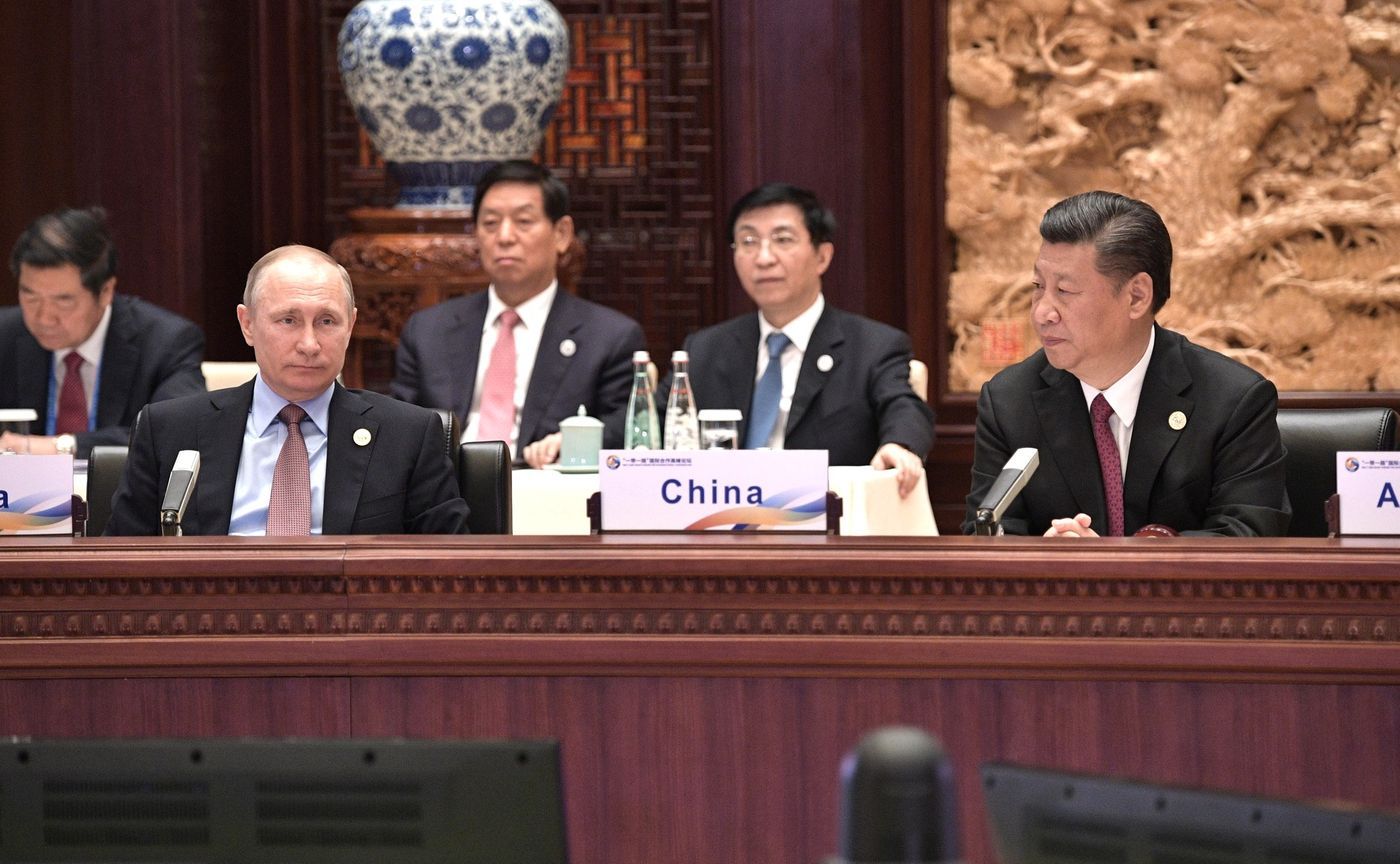
On October 25, 2017, 62-year-old Wang Huning was elected as a member of the Standing Committee of the Political Bureau of the CPC Central Committee (ranked fifth)[12] and secretary of the Central Secretariat (ranked first) at the First Plenary Session of the 19th CPC Central Committee, entering the top leadership , and later concurrently served as the director of the Central Steering Committee for the Construction of Spiritual Civilization, in charge of national ideological work[13], and continued to serve as the director of the Office of the Central Leading Group for Comprehensively Deepening Reform[14]. He also concurrently serves as the deputy director of the Central Committee for Comprehensive Governance by Law, the leader of the Central Propaganda and Ideological Work Leading Group, the leader of the Central Party Construction Work Leading Group, the deputy director of the Central Organization Organization Committee, the deputy director of the Central Network Security and Informatization Committee, and the member of the Central Finance and Economics Committee. , Deputy Director of the Central Military-Civilian Integration Development Committee, Director of the Party and National Meritorious Honor Commendation Working Committee. In May 2019, the CCP carried out the theme education of "never forget the original intention and keep the mission in mind", and Wang Huning served as the leader of the theme education leading group [15].
In January 2020, a new type of coronavirus pneumonia spread across the country. Wang Huning served as the deputy head of the Central Leading Group for Responding to the Novel Coronavirus Pneumonia Epidemic, and led the anti-epidemic work together with Li Keqiang [16].
family
The first ex-wife Zhou Qi (November 1952-) : Beijing native, international relations expert; graduated from the Department of International Politics, Shanghai Fudan University in February 1980, worked in the "Taiyuan Daily" newspaper office from March to August 1980, 1980 From September 1983 to July 1983, he studied at the Department of International Politics of Fudan University and obtained a master's degree. From November 1986 to January 1988, he studied at the Institute for Advanced International Studies of Johns Hopkins University in the United States. From January 1990 to 1991 In September 2009, he was a visiting scholar at Harvard University in the United States. He is currently the deputy director of the research office, a director of the British Research Association, and a director of the Shanghai European Society. Zhou Qi and Wang Huning are Fudan alumni. After graduation, they both stayed at the school to teach and got married. In May 1994, Zhou Qi left Shanghai to work at the Institute of American Studies of the Chinese Academy of Social Sciences in Beijing, and lived apart from Wang Huning for a year. In 1995, Wang Huning was also transferred to Beijing to serve as the head of the political group of the Policy Research Office of the CPC Central Committee; the couple divorced in 1996.
The second ex-wife Xiao Jialing (April 1966-) : Born in Hunan Province, Fudan University Doctor of Laws, currently an associate professor of the School of International Relations and Public Affairs, a member of the Shanghai Society of International Relations, and a distinguished researcher at the Japanese Research Center of Fudan University. Completed undergraduate, master, and doctoral education in International Relations, Department of International Politics, Fudan University, and received a doctorate in law in May 1997. Wang Huning was Xiao Jialing's doctoral supervisor at the time. From 1999 to 2001, he was engaged in postdoctoral research in the Faculty of Law, University of Tokyo, Japan. Visiting scholar at Yale University in the United States and Sciences Po in France. Xiao Jialing married Wang Huning in 1998, but Xiao Jialing still lived in Shanghai after marriage, and Wang Huning lived in Zhongnanhai, Beijing. They divorced because of less gatherings in different places and more divorces.
The third wife (1985-): Born in Qingdao City, Shandong Province, married Wang Huning in May 2014. After marriage, she lived in seclusion and became a full-time wife.
Major works
"Comparative Political Analysis"
The Logic of Politics—Principles of Marxist Political Science
"America Against America"
"Political Life"
"New Politics Outline"
"Analysis of Contemporary Western Politics"
"Talk of the Lion City"
evaluate
As Xi Jinping's long-term assistant, Wang Huning has been compared by some media to China's Henry Kissinger[17][18].
Xia Ming, a professor of political science at City University of New York, released his new book "The Empire of the Red Sun- The CCP's Last Loot". , but believe in "relativism of political ecology"; use Western Marxist theorems to deny Western universal values and create so-called Eastern "rationality" for "China's development path" [19].
Chen Pokong, a political writer living in the United States, believes that as Xi Jinping’s theoretical designer, Wang Huning, a member of the Politburo Standing Committee in charge of ideology, is the brain of the CCP and the source of extreme leftist thoughts. “Xi Jinping’s Marxism is actually Wang Huning’s Marxism; The so-called Xi Jinping Thought is actually Wang Huning Thought” [20].
note
From May 1972 to July 1980, East China Normal University was renamed "Shanghai Normal University".
references
Wang Huning: Member of the Political Bureau of the Central Committee. Shandong Chamber of Commerce in Shanxi Province-Shandong Hall of Fame. [2019-02-21].
Resume of Comrade Wang Huning. People's Daily Online. [2017-10-04].
Interpretation of the list of members of the new Politburo Standing Committee of the Communist Party of China. Wall Street Journal. 2017-10-27 [2018-03-19].
Doctoral Supervisor Professor Wang Huning - "Journal of Fudan (Social Science Edition)" 1994 Issue 03. CNKI. [2017-10-04].
Xia Ming: My ten-year relationship with Wang Huning. Duan Media. 2017-11-02.
Yu Wujin: Thinking to the last moment. China Communist Party News Network. [2017-11-13].
Gong Danyun. Twenty years of tongue war in Lion City. People's Daily Online. 2013-08-19.
Fan Xiaozhou. General Secretary Xi’s view on employing people. Global People. 2014, (25).
Wang Huning is the think tank of the three dynasties. Apple Daily. 2017-10-26.
Who are the six closest people to Xi Jinping during his visit to the United States. Zhejiang News. 2015-09-29 [2020-04-07].
Su Qingtao. Cold-faced Wang Huning: From a scholar to the first think tank of the "Red Wall". New Tongxiang. 2014, (3).
The First Plenary Session of the 19th CPC Central Committee elected Xi Jinping, Li Keqiang, Li Zhanshu, Wang Yang, Wang Huning, Zhao Leji, and Han Zheng as members of the Politburo Standing Committee. Xinhuanet. 2017-10-25 [2017-10-25].
Wang Huning made his public report as the director of the Central Civilization Commission for the first time. Netease. 2017-11-18 [2017-11-18]. (The original content was archived on 2017-12-01).
After the 19th National Congress of the Communist Party of China, important institutions held meetings, and the standing committee members attended changed. Phoenix.com. 2017-11-20 [2017-11-21].
Xi Jinping: Staying true to the original intention, shouldering the mission, finding gaps and implementing them to ensure that the theme education achieves solid results. Xinhuanet. 2019-05-31 [2020-04-07].
Li Keqiang presided over the meeting of the Central Leading Group for Responding to the Novel Coronavirus Pneumonia Epidemic. Xinhuanet. 2020-01-26 [2020-01-26].
Jakhar, Pratik. China party congress: The rising stars of China's Communist Party. BBC News. 2017-10-08.
Kong, Tom Phillips Benjamin Haas in Hong. The omnipotent seven: meet the men who make up China's new politburo. The Guardian. 2017-10-25 [2020-01-09]. ISSN 0261-3077 (UK English).
Chen Pokong: Parting ways with Wang Huning——Reading Xia Ming's "Empire of the Red Sun".
Focus Dialogue: The CCP is becoming more and more left, who is leading Xi Jinping, Wang Huning? .
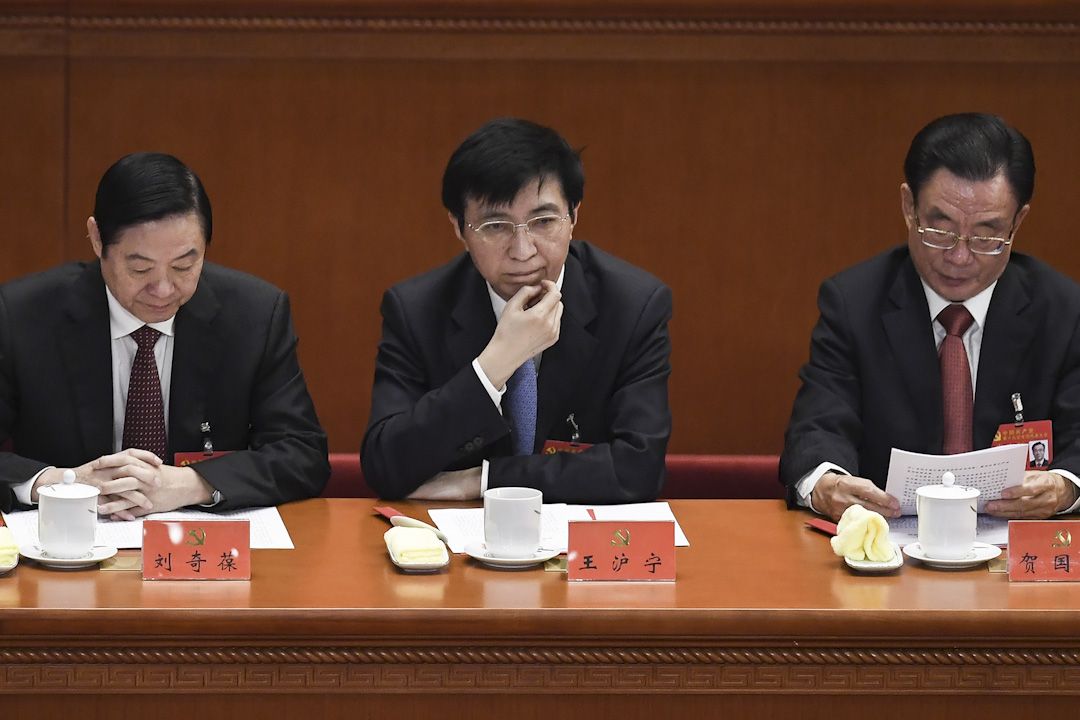
From a star scholar to an emperor of the Three Dynasties, who is Wang Huning who has advanced to the pinnacle of the CCP's power?
Wang Huning, a Shanghai scholar born in 1955, came to Beijing at the age of 40 and entered politics as an aide. He created programmatic political discourses for Jiang, Hu, and Xi respectively. The diary "Life in Politics" published before entering Beijing recorded his original thinking and initial values.
Staff Writer Xue Huazi
2017-10-25
"Society's progress and contradictions are often the result of the combined effects of various temptations that people are subjected to. In modern times, the biggest temptation is the temptation of 'democratic politics'. Therefore, in the process of social development, we must effectively promote democracy. The development of politics, freeing people from this temptation, whether positive or negative, is an important condition for social stability.”
This passage, recorded in Wang Huning's diary "Life in Politics" published in January 1995, is his opinion when discussing "the model and path of democratic political development in China" with his doctoral students.
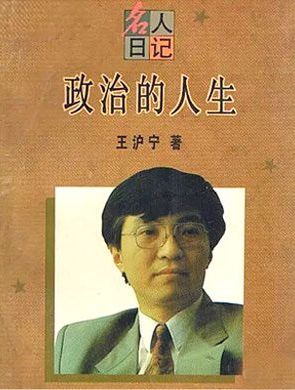
Wang Huning, a young political scientist, reminds his students that when analyzing democracy, they must first “clean” their own value system. The Western value system entered China along with Western material civilization. “Our reference system is more or less replaced by Western values. The frame of reference has been 'radiated'. Today, we need to discover new political values from our own cultural traditions."
It was 1994, Jiang Ze's fifth year in power in China. At that time, 39-year-old Wang Huning had just become a doctoral supervisor. He gave a long discussion outline to the doctoral course "Chinese Society and Politics", eagerly discussing various issues of China's direction.
A year later, Wang Huning was called to Beijing and started his official career as an aide. Beginning in 1995, his career in politics, from the head of the Political Group of the Central Policy Research Office, deputy director to director, from a member of the Central Committee and secretary of the Central Secretariat to a member of the Politburo, has skyrocketed all the way, reaching the peak of power in October 2017 --blinkled hard.
Unlike the prevailing eligibility criteria for members of the Politburo Standing Committee, he entered politics as an aide, but never had political qualifications in grassroots governance. Therefore, Wang Huning was favored as a "veteran of the three dynasties" and his status was rising, not only because of his role as the center of policy staff, but more importantly, as an important theoretical think tank, he was also responsible for providing programmatic political discourse for the CCP as the ruling party .
Wang Huning is widely regarded as the direct participant and drafter of Jiang Zemin's "Three Represents" and Hu Jintao's "Scientific Outlook on Development". After Xi Jinping came to power, Wang Huning was promoted in an exceptional way, directly from the director of the Central Policy Research Office to the Politburo of the Communist Party of China. Together with Li Zhanshu, he became Xi Jinping's "right-hand man". He is also responsible for the birth of the "Xi Jinping Thought on Socialism with Chinese Characteristics for a New Era" in the party constitution.
In the 95-year history of the CCP, the only person who entered the core of power from a "theoretician" and "pen" and officially became a member of the Standing Committee of the Politburo was Chen Boda in the Mao era.
What is China's future? Thoughts from Star Scholars to the Peak of Power
Wang Huning, born in Shanghai in 1955, graduated from junior high school in 1971. Due to frailty and illness, he did not go to the mountains and countryside, but stayed at home to study by himself. In a rare media report, "Caijing" magazine described Wang Huning as "showing a tendency to like philosophy and political thinking in his youth". In 1974, he was recommended to the Department of Foreign Languages of Shanghai Normal University to study French, and later engaged in research work at the Shanghai Academy of Social Sciences. In 1978, he was admitted to the Department of International Politics of Fudan University as a postgraduate student. He studied under Chen Qiren, an authority on Capital, and later published Political Science. The logic of Marxism - Principles of Marxist Political Science.
After graduating in 1981, Wang Huning stayed at the school to teach. He has successively served as a teacher, associate professor, professor, director of the International Politics Department of Fudan University, and dean of the Fudan University Law School. Not only that, "In the 1980s, Wang Huning was already a well-known young scholar in the academic circle. He became the cover figure of current affairs magazines such as "Half Moon Talk" at that time. The drafting work of important theoretical documents of the Communist Party of China since the 13th National Congress of the Communist Party of China.”
Regarding Wang Huning’s scholarship in the 1980s, a special article in Caijing magazine commented: “His abundant writings and hard work in his scholarship became a major spectacle in the academic world in the 1980s. Wang Huning’s talent in political science began as early as Before the 13th National Congress of the Communist Party of China, the leaders of the party and the country had taken a fancy to it. At the beginning of the reform and opening up, the party and the country especially needed a complete set of insightful political theories as a reference, and Wang Huning’s academic theories were always favored. Among them , his "Comparative Political Analysis" is a very representative work."
And Wang Huning entered the public eye as the coach of the debate team. In 1993, he led the debate team of Fudan University to Singapore to participate in the "International Chinese College Debate Competition" and won the championship by defeating the Taiwan University team in the final. At that time, China broadcast the whole competition live for the first time on TV. Suddenly, the debate team members and their coach Wang Huning became The "star" of the new generation of China. The subsequent publication of "Apocalypse of the Lion City Tongue War" was a bestseller of the year.
After the debate contest, Wang Huning wrote "Consultant's Notes", in which he recorded his impressions during his brief visit to Singapore during the trip: "What is the future of China? Singapore is a modernized Chinese society. We are looking for ways to deal with all kinds of challenges... What kind of problems will China encounter? This challenge is faced by Chinese communities all over the world.”
This is also the core question that Wang Huning has been asking throughout his academic career. He firmly believes that whether it is political values or economic laws, the answer will not always be in the "West".
The greatest achievement of Deng Xiaoping's reform and opening up was to end the planned economic model of Mao Zedong's era and introduce market mechanisms, but this brought a difficult problem for the CCP in terms of theory and ideology. The two general secretaries of the party, Zhao Ziyang and Zhao Ziyang, were deposed by Deng Xiaoping, leaving behind unresolved political system reform issues. Therefore, there is a lack of theoretical discourses that can maintain the legitimacy of the Communist Party of China, which can not only inherit the fundamental theory of the Communist Party of China’s establishment of the government—Marxism, but also connect with the market economy and the globalization pattern. In Wang Huning's own words: "Marxist political parties must study new situations, analyze new problems, propose new ideas, and formulate new theories. Otherwise, they will lag behind the pace of development of the times and the interests of the people."
Wang Huning, who is still a scholar, has proposed research topics such as new authoritarianism, the centralized modernization model, and the political system model with Chinese characteristics, plus his in-depth research on "Das Kapital" and his professional background in international politics. He has become a theoretical trader that the CCP leaders urgently need to win.
The October 2007 article "New Secretary of the Secretariat: Wang Huning" in "Caijing" magazine summarized Wang Huning as follows: "Wang Huning entered Zhongnanhai mainly because his theoretical work met the needs of reform and opening up. He drafted the important theoretical documents of the party since the founding of the Communist Party of China. Among them, his discussion on the implementation of political system reform and democratic politics can not go beyond China's current conditions provides an important reference for China's political reform. "
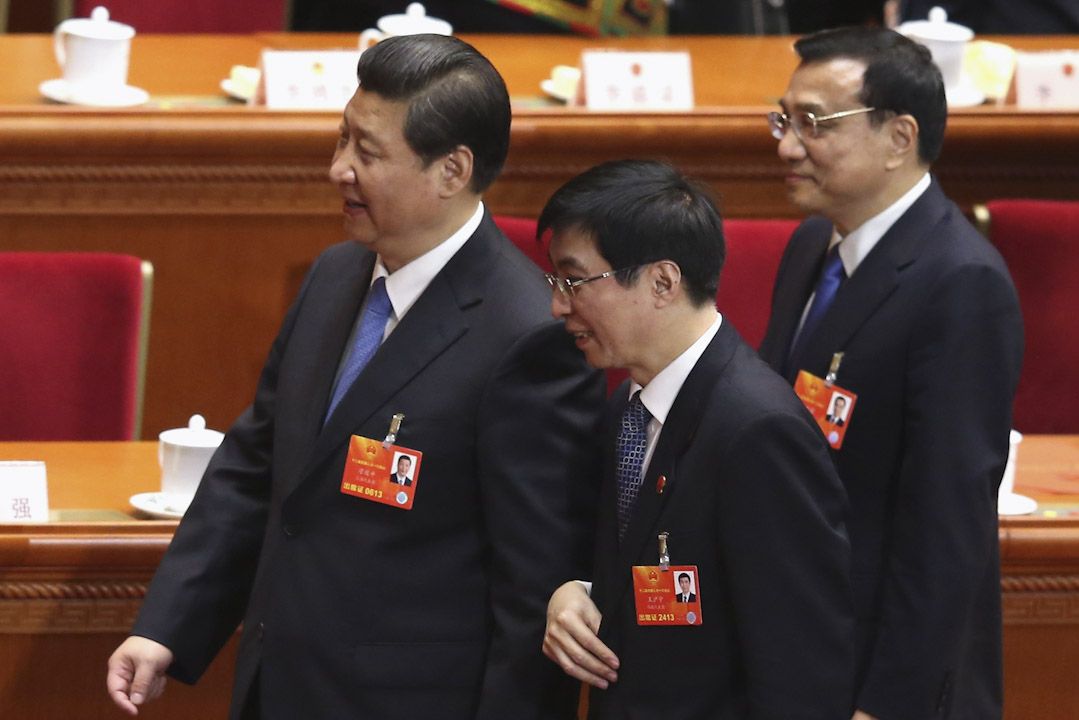
In 1994, the diary directly recorded values
The impression Wang Huning left on the public is low-key and mysterious. In addition to published academic works, the rare publication "Life in Politics", just like its name, has become one of the few public materials for the outside world to get a glimpse of Wang Huning's true face. However, we can almost see the whole picture of China's development trajectory in the past three decades.
In 1995, the "Celebrity Diary" series of books planned by Shanghai People's Publishing House invited seven cultural and academic celebrities, including Sha Yexin, Liu Xinwu, Pan Hong, Zhao Lihong, Liu Ji, Wang Huning, etc., to compile the diaries published within one year in 1994 . Wang Huning titled this year's life and research experience "Political Life". He said in the preface: "Everyone who lives in the contemporary world and today's China cannot be non-political."
The writing style of "Life in Politics" is calm, but straightforward. Among them, there are a lot of reading notes and miscellaneous feelings in life. Wang Huning asked himself to "eclectic and read a lot of books". From "Kinsey Sexology Report" to "Escape from Freedom" and "Economics", he loves reading novels and watching movies. Write down your own ancient poetry. In addition, the book records many lecture outlines, discussions, research topics, and new book ideas, all of which directly present his values, priorities, and ambitions, as well as his views on China's direction.
Unlike Liu He and other economic staff, Wang Huning, who later moved to Beijing, as a political staff of the CCP, can no longer express his views in his own name. Therefore, his views on politics and economics, except for books published before 1995, cannot be seen in news reports.
Looking back at "Life in Politics" more than 20 years later, many of the views of those years have surfaced and become reality, and some are still brewing and planning, and may be coming soon.
He recorded his thinking process for his new book "Government in a Post-Revolutionary Society——Second Exploration of China's Modernization":
"The political system model with Chinese characteristics, the basic understanding is: China's development needs to have the authority that can regulate the whole society. Several basic problems need to be solved: the relationship between super society and political regulation, one-party leadership and democracy. The relationship between politics, the relationship between public ownership and political system, the relationship between ethical democracy and legal democracy.”
"Will Chinese society be chaotic? We must pay attention to the four major systems: the army, the political party, cadres and intellectuals. As long as there are no problems in these four systems, China will be able to develop stably."
Regarding the views on Marxism, Wang Huning wrote in his diary:
"I still think that the ideals put forward by Marx as a philosopher are lofty, and no one can surpass them. Marx was the first to see the development of capitalism. While producing huge productive forces, he also produced alien forces that became more and more divorced from people. , put people more and more under the rule of this kind of power. In fact, the changes of democratic politics since modern times are closely related to the material power of capitalism. The dilemma of democracy caused by the interweaving of powerful science and technology is very close to the historical development trend seen by Marx nearly 150 years ago. Periodic economic crises have led to people's doubts about the capitalist economic system, and then these The problem has gradually developed into the social, cultural and political fields. People have doubts about the political form of capitalism—democracy itself, because it can no longer cope with the powerful forces that are increasingly overflowing in this society. For economic power and political domination The relationship between the methods is very profound, and it is also the real logic of Marx's way of looking at problems."
He also recorded his views on Nietzsche and Stalin: "Nietzsche's theory is worth studying, because he put forward his political thought in an era when the world order needs to be changed. His purpose is to establish a new order, and finally sustenance In "Superman". Generally, when there is such a need in history, that is, when a new order needs to be established, there will always be such an idea, advocating the establishment of a new order by force and through strongmen."
"Reading "The Mystery of the Stalin Era" in the early morning, criticizing Stalin from the negative side, almost making Stalin useless, this is the easiest thing to happen after a great man. One is to continue to maintain his prestige and use it to achieve certain goals, Another tendency is to deny his achievements to achieve another purpose. Society or history often chooses between the two. But no matter how you choose, you can’t get rid of great people. Without great people, there will be no history."
In 1994, Wang Huning also proposed the concept of "super-corruption", and believed that there are two important characteristics. One is that it is often completed with the participation of certain public powers. Without the participation of public powers, the purpose of obtaining benefits or excess benefits cannot be achieved. Appears as a group. The solutions he proposed include: severely crack down on high-volume corruption, resolutely put an end to high-quality corruption, strictly prevent high-level corruption, effectively overcome foreign corruption, and pay attention to stopping diverse corruption.
Wang Huning and He Dongsheng in "The Prosperity"
In 2009, Hong Kong writer Chen Guanzhong's political prophecy novel "Golden Age: China, 2013" was published in Hong Kong, predicting the arrival of a prosperous utopia. At that time, the outside world generally believed that the lifelike national leader He Dongsheng in the novel was based on Wang Huning.
In "The Prosperity", He Dongsheng's confession after being kidnapped, the analysis of the "Ice and Fire Prosperity Project", "Pan-Eurasia Energy Bridge", the use of big data to control prices, the East Asian Monroe Doctrine and the tributary system, etc., can be seen Wang Huning's thinking The shadow of the context, and read the ideas and analysis that are consistent with the Chinese Dream and the Belt and Road Initiative. The "post-totalitarian autocratic big government" in the novel also seems to have the same allusion to the centralized modernization model carefully laid out by Wang Huning.
Today, the life ideal of "writing a few good books and teaching a few good students" in Wang Huning's diary is doomed to fail, but he has not deviated from his own life orientation, just as he himself said:
"People living in this world, some are strong, some are weak. Some require others to set goals, and some set goals for others. Some need emotion to support life, and some need will to support life. I probably In every pair of concepts, the latter will be chosen." (January 11, 1994, click here to view the original text)
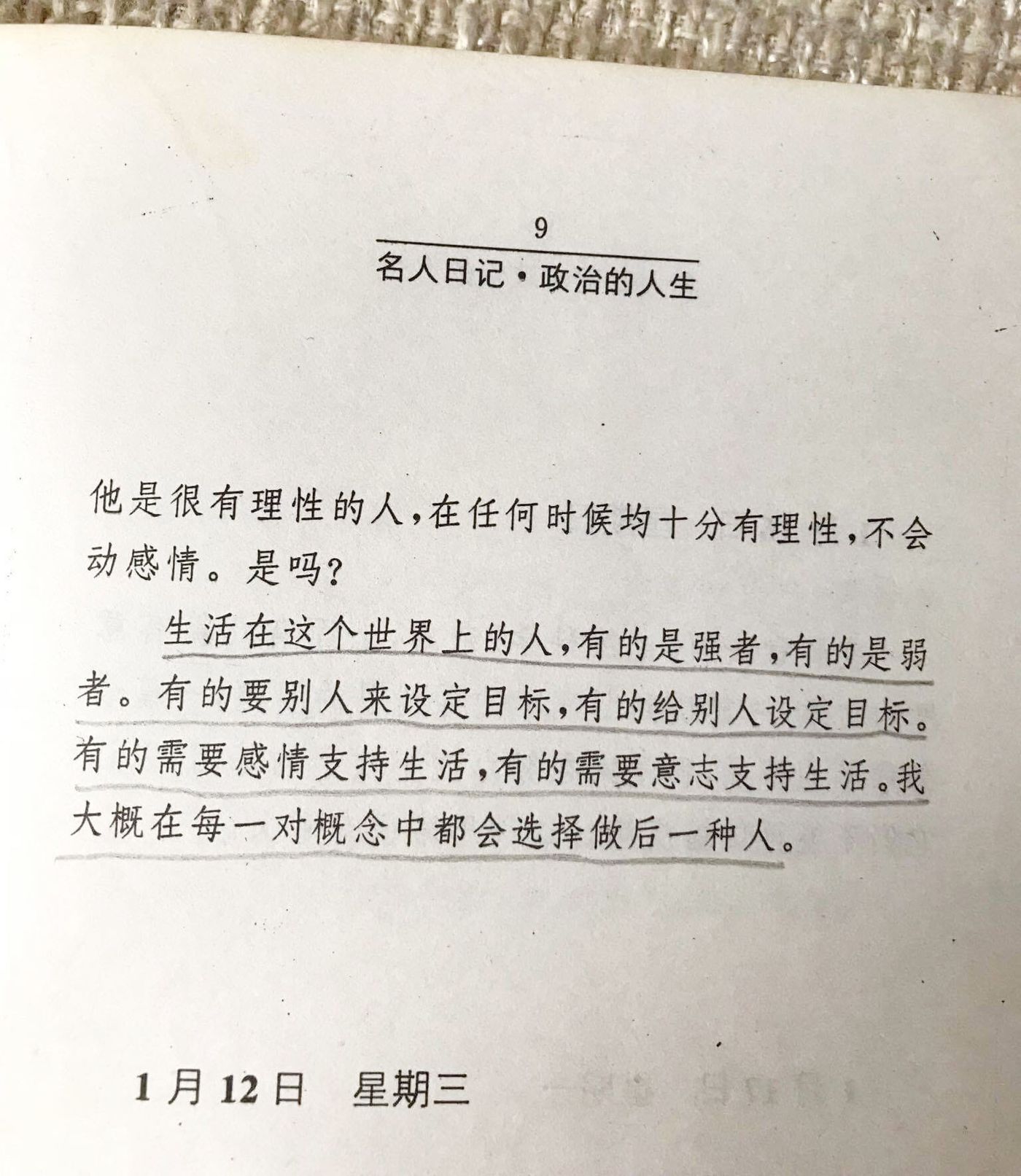
Like my work? Don't forget to support and clap, let me know that you are with me on the road of creation. Keep this enthusiasm together!
